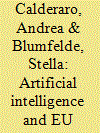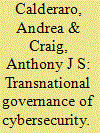|
|
|
Sort Order |
|
|
|
Items / Page
|
|
|
|
|
|
|
| Srl | Item |
| 1 |
ID:
187080


|
|
|
|
|
| Summary/Abstract |
EU Digital Sovereignty has emerged as a priority for the EU Cyber Agenda to build free and safe, yet resilient cyberspace. In a traditional regulatory fashion, the EU has therefore sought to gain more control over third country-based digital intermediaries through legislative solutions regulating its internal market. Although potentially effective in shielding EU citizens from data exploitation by internet giants, this protectionist strategy tells us little about the EU’s ability to develop Digital Sovereignty, beyond its capacity to react to the external tech industry. Given the growing hybridisation of warfare, building on the increasing integration of artificial intelligence (AI) in the security domain, leadership in advancing AI-related technology has a significant impact on countries’ defence capacity. By framing AI as the intrinsic functioning of algorithms, data mining and computational capacity, we question what tools the EU could rely on to gain sovereignty in each of these dimensions of AI. By focusing on AI from an EU Foreign Policy perspective, we conclude that contrary to the growing narrative, given the absence of a leading AI industry and a coherent defence strategy, the EU has few tools to become a global leader in advancing standards of AI beyond its regulatory capacity.
|
|
|
|
|
|
|
|
|
|
|
|
|
|
|
|
| 2 |
ID:
171923


|
|
|
|
|
| Summary/Abstract |
Connectivity infrastructure is constantly expanding, increasing internet access across countries, regions and socio-political contexts. Given the fast-changing geography of the internet, there is a growing demand to strengthen cyber capacity beyond national frameworks, in order to develop a transnationally coherent and coordinated governance approach to cybersecurity. In this context, cyber capacity building initiatives are increasingly central in international debates, with the ambition to support countries in the Global South in fostering their cybersecurity strategy from technical and policy perspectives. This article discusses the key factors explaining states’ efforts to enhance their cyber capacity. Based on a cross-national quantitative research approach, the findings contradict international relations (IR)-derived approaches to cybersecurity, which assume that countries develop their cyber capacity according to external security threats, domestic politics or norms. In line with existing research on the role that science plays in policymaking processes more broadly, our results suggest instead that a country’s science and technical knowledge is the most robust explanation for that state’s cyber capacity level. These findings emphasise the need for policymakers to support countries in the Global South in developing their cyber capacity beyond national security paradigms by strengthening education and technical skills in contexts lacking in this resource.
|
|
|
|
|
|
|
|
|
|
|
|
|
|
|
|
|
|
|
|
|